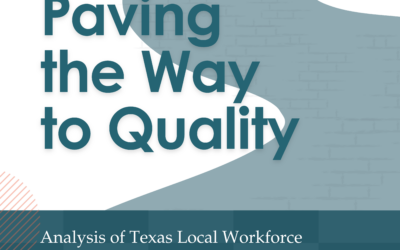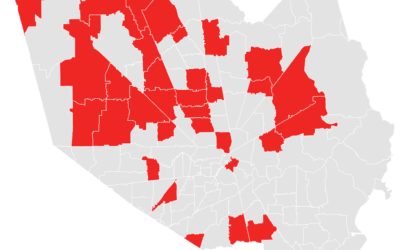Research & Data
PROMOTING DATA-DRIVEN PUBLIC POLICIES
The Center for Social Measurement and Evaluation (CSME) supports the research and evaluation efforts across all of
Children in Texas Public Schools
Economically Disadvantage Students in Texas Public Schools
children are in the emergent bilingual/English learner program
Center for Social Measurement and Evaluation
One in ten children in the U.S. is born in Texas. Providing 10% of our country’s population with a quality education is critically important to the future of our local, state, and national economies.
Primarily achieved through our Center for Social Measurement and Evaluation (CSME), CHILDREN AT RISK works to ensure all Texas children have access to quality education, so they have the skills necessary to thrive in our 21st-Century economy.
Through strategic partnerships, CHILDREN AT RISK researches trends, inequities, resources, and opportunities to improve public education. We use this research to educate policymakers and advocate for better education policies
The Center for Social Measurement and Evaluation (CSME) supports the research and evaluation efforts across all of CHILDREN AT RISK’s primary issue areas, centers, and policy initiatives. CSME produces data tools to empower individuals with the information they need to drive and inform policy change.
Data-Driven Community Advocacy Tools
CSME designs and disseminates data-based research tools including:
- Annual School Rankings
- School data for parents
- Early education data and interactive maps
Research & Evaluation
CSME assesses the impact of policies and programs, resulting in evaluations including:
- Nonprofit program evaluation
- Corporate social investment reports
- Community health needs assessments
- Fiscal evaluations
Publications
CSME produces research-oriented publications including:
- Growing Up in Houston
- Growing Up in North Texas
- The Journal of Applied Research on Children
- The Journal of Family Strengths
Our Latest Research & Data Analysis
Texas Child Care Honor Roll
Media Contacts: Morgan Gerri, 832.600.9354 Rashena Franklin 713.301.4577 Research shows that 90% of brain development occurs in the first five years of a child’s life. This period is foundational—what children learn, or don’t learn, during these early years can...
Access to High-Quality Child Care is Scarce 2025 Analysis: Texas Child Care Deserts
Access to High-Quality Child Care is Scarce April 25, 2025 | C@R Blog, Early Childhood Education, Research Written by Kim Kofron, Senior Director of Education, and Jenn Meier, Associate Director of the Center for Social Measurement & Evaluation, CHILDREN AT...
Charting Success
Charting Success Evaluating the Classroom Experiences of Children of Immigrants in TexasOur children are charting a new course for America. They are at the leading edge of the nation’s growing diversity. Approximately 53% of the U.S. population under age 18 belonged...
Textual Analysis of Local Workforce Board Strategic Plans:
Textual Analysis of Local Workforce Board Strategic Plans: Opportunity Youth & Young Adults Local Workforce Development Boards are crucial in developing regional workforces and supporting our local economies. Young people are the cornerstone of Texas' future...
Legislative District Profiles | Opportunity Youth & Young Adults
Welcome to CHILDREN AT RISK's Opportunity Youth & Young Adults Policy Resource hub, where you can explore the economic and data landscape of each Texas House and Senate district.Texas’ youth have the power to drive a thriving economy and vibrant communities. Yet,...
Paving the Way to Quality
In 2022, CHILDREN AT RISK unveiled The Quest for Equity and Quality, a groundbreaking report that highlighted significant disparities in child care providers' experiences with the Texas Rising Star (TRS) program across the state. Now, our latest report, Paving the Way...
C@R’s Early Childhood Advocates Host Legislative Briefing
C@R Travels to Austin with Fellow Advocates Hosts 2024 Legislative Briefing on Early Childhood EducationOn Wednesday, September 4th, CHILDREN AT RISK hosted a significant Capitol Briefing on Early Childhood Education in Austin, Texas. This briefing, sponsored by...
Fall 2024 | Early Childhood Education Texas Tour
CHILDREN AT RISK's Early Childhood Texas Tour is coming to a city near you, and you won’t want to miss it. C@R is hitting the road with 12 in-person stops across the state, bringing together child care providers, community leaders, and anyone passionate about...
Legislative District One-Pagers: Early Childhood Education
Welcome to CHILDREN AT RISK's Early Childhood Education Policy Resource hub, where you can explore the child care landscape in each Texas House and Senate district.Texas’s economic success hinges on a stable workforce, with employers and working parents relying...
2024 Latino Child Health Initiative Map
Latino Health Initiative Neighborhood Analysis Latino children endure disproportionate probabilities of suffering from systemic inequities, particularly regarding health and healthcare services. Language barriers, immigration status, lack of transportation and...
2024 Texas Tour | Child Care & Early Childhood
Written by Jacob Westjohn, Program Coordinator, C@R The Children At Risk team is incredibly grateful to all of the community members who shared their perspectives and expertise with us during the Texas Tour. These events are a valuable opportunity to discuss the needs...
Subsidized Child Care System in Texas
Because money is often a critical barrier to accessing child care, Texas gives working families subsidies that can help them pay for child care. Where does the money for child care subsidies come from, where does it go, and who is left out? Here's a quick primer:...






